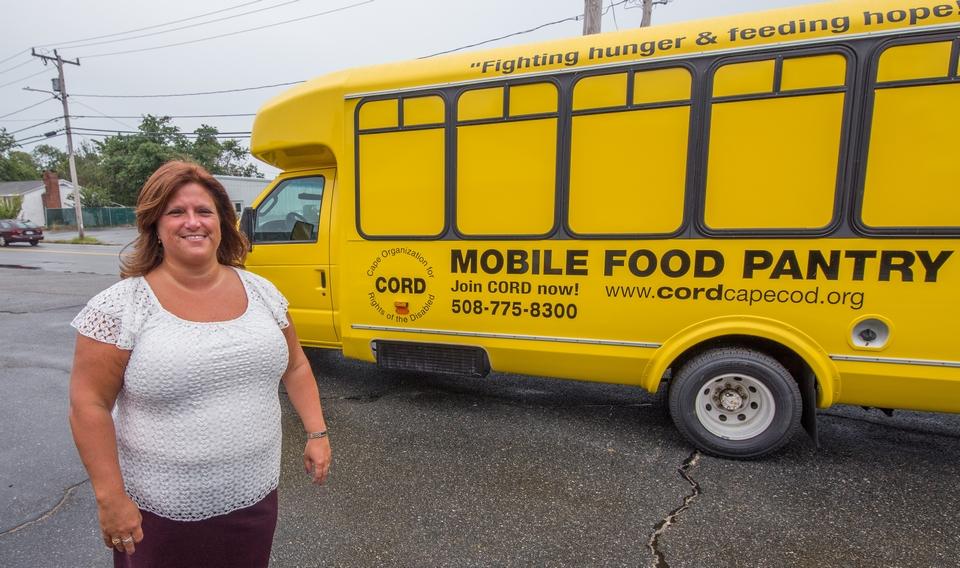Cape disabilities group launches mobile food pantry
The wheels on this bus will go round and round the Cape. But instead of carrying passengers, it will be delivering food to a surprisingly large population at risk of hunger: people with disabilities who might not be able to get to a traditional pantry. Census figures suggest that there may be as many as 10,000 such people on our peninsula.
Probably sometime in October, the Cape Organization for the Rights of the Disabled (CORD) will launch the bus’s first run from the parking lot of its Hyannis office at 106 Bassett Lane. Although the route has not yet been finalized, the plan is for the bus to stop at at least one site in each of the 15 Cape towns every week.
CORD executive director Coreen Brinckerhoff will drive the bus herself, at least until volunteers step forward. Drivers don’t need to have a commercial driver’s license (CDL) to run the bus, which is an old B-Bus donated by the Cape Cod Regional Transit Authority. CORD also is looking for volunteers to ride the bus and help hand out the food. The bus will not provide door-to-door service but will park at sites such as housing for the elderly and disabled.
Painted a brilliant school-bus yellow and bearing the slogan “Fighting hunger & feeding hope!” the Ford E-450 bus has been retrofitted with shelves rather than passenger seats, thanks to money donated by seven Rotary clubs around the Cape, said Brinckerhoff.
Most of the food to be distributed will come from the Greater Boston Food Bank, via its Cape depot at the Harwich Family Pantry. CORD will also accept donated non-perishable food at its Bassett Lane office, and of course cash is also welcome. At present, they cannot take meat or fresh produce; they are hoping to get a refrigerated vehicle on the road later.
Brinckerhoff said that CORD determined the need for a mobile food pantry from a 2013 report, “Status of Hunger in Massachusetts,” issued by the Metropolitan Area Planning Council. According to that paper, CORD’s service area (the Cape and islands) has 28,479 residents with disabilities, and around a third of those experience “food insecurity,” or “the limited or uncertain availability of nutritionally adequate and safe food.”
CORD offers all of its services on a “self-disclosure” basis, Brinckerhoff said, which means that they do not require any proof, other than a person’s own word, that they are disabled. The same will apply to those who come to the mobile food pantry. “We won’t have restrictions about anyone having to be a CORD consumer, or how often you can come,” Brinckerhoff said.
She added that if circumstances permit, perhaps the mobile pantry will add over-the-counter medicines and paper goods, but for now those items will not be available.
Brinckerhoff emphasized that this mobile pantry is “complementary, not competitive” with the many other food pantries on the Cape. “The pantries do a tremendous job. Some of them even deliver.” But a service that targets people with both disabilities and food insecurity will be a new participant in the community effort to address hunger, she said. The Massachusetts Rehabilitation Commission has also supported the project financially.
“People are stepping up” to help the mobile food pantry, said Brinckerhoff. Even a cleaning of the renovated interior is donated. “It’s all happening pretty quickly,” she said.
And even though for now she has to drive the bus herself until others sign up to help: “I can’t wait to get rolling.”
There are several ways to contact CORD. Phones, both of which accommodate TTY, are 508-775-8300, or 800-541-0282, or cilcapecod.org
A launch event for the mobile food pantry is planned for 11 a.m. on Sept. 23, with place to be determined.
CORD’s mission, according to its literature, is “to advance the independence, productivity, and integration of people with disabilities into mainstream society.” It is a 501(c)(3) non-profit organization and does not charge a fee for its services.

